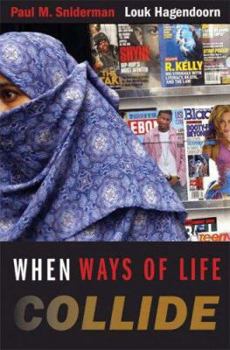When Ways of Life Collide: Multiculturalism and Its Discontents in the Netherlands
Select Format
Select Condition 
Book Overview
In 2004, Dutch filmmaker Theo van Gogh was brutally murdered on a busy Amsterdam street. His killer was Mohammed Bouyeri, a twenty-six-year-old Dutch Moroccan offended by van Gogh's controversial film about Muslim suppression of women. The Dutch government had funded separate schools, housing projects, broadcast media, and community organizations for Muslim immigrants, all under the umbrella of multiculturalism. But the reality of terrorism and radicalization of Muslim immigrants has shattered that dream. In this arresting book, Paul Sniderman and Louk Hagendoorn demonstrate that there are deep conflicts of values in the Netherlands. In the eyes of the Dutch, for example, Muslims oppress women, treating them as inferior to men. In the eyes of Muslim immigrants, Western Europeans deny women the respect they deserve. Western Europe has become a cultural conflict zone. Two ways of life are colliding. Sniderman and Hagendoorn show how identity politics contributed to this crisis. The very policies meant to persuade majority and minority that they are part of the same society strengthened their view that they belong to different societies. At the deepest level, the authors' findings suggest, the issue that government and citizens need to be concerned about is not a conflict of values but a clash of fundamental loyalties.
Format:Hardcover
Language:English
ISBN:0691129061
ISBN13:9780691129068
Release Date:February 2007
Publisher:Princeton University Press
Length:176 Pages
Weight:0.15 lbs.
Dimensions:0.8" x 6.0" x 9.3"
Customer Reviews
1 rating
Useful critique of multiculturalism
Published by Thriftbooks.com User , 17 years ago
The authors, two Dutch social scientists, write, "When we speak of ways of life colliding, we have in mind genuine differences about what is right and wrong embedded in a larger context of common ground." This is not the ‘clash of civilisations’, beloved of warmongers. They write, "Our concern is the collision between Western European values and Muslim values. Our focus is the Netherlands because it has undertaken the most ambitious policy of multiculturalism. The premise of multiculturalism as a principle is respect for the pluralism of cultures. Yet its thrust as a public policy has been to legitimize and subsidize one particular expression of Muslim culture – ironically the one most at odds with the pluralistic spirit of liberal democracy." They show how multiculturalism has preserved and promoted the most illiberal version of Muslim practices that holds sway only in traditional, rural and remote areas of the Middle East. Multiculturalism legitimised an authoritarian and inegalitarian approach to women and children. Multiculturalism has given special status to traditional, unelected, ‘community leaders’ and even set up a separate, state-funded school system in Holland. They conducted their survey in 1998, before 9/11, before the murder of Theo van Gogh, the controversial film-maker. They found, "In all of our studies across a variety of countries, the single best predictor of prejudice towards minorities is the importance that people attach to the value of conformity." However, they found that intolerance and criticism of multiculturalism are not the same. They also found that, "Even among the most tolerant, on the order of a half support raising the barriers to immigration, and the support for doing so rapidly becomes overwhelming. There is thus support for making immigration more difficult throughout the society." They note that multiculturalism’s "sensitivity to the threats that immigrant minorities perceive to their way of life has been accompanied by an insensitivity to the threats that the majority perceive to their way of life." The policy of multiculturalism was not the result of popular pressure – indeed it is a deeply unpopular policy. This raises the question - if the majority want stricter immigration controls, oppose multiculturalism and want a greater degree of assimilation, shouldn’t this be what happens in a democracy?






